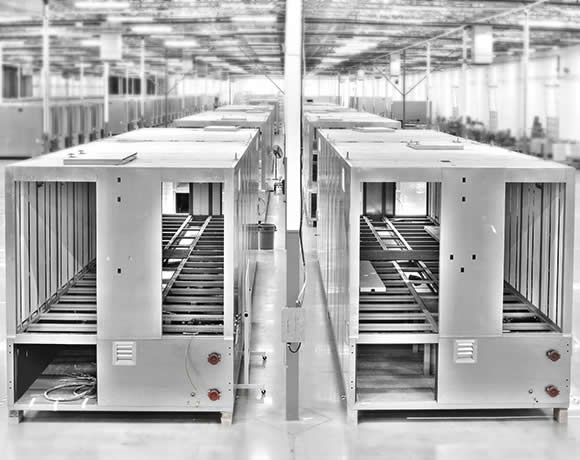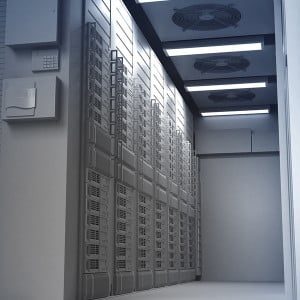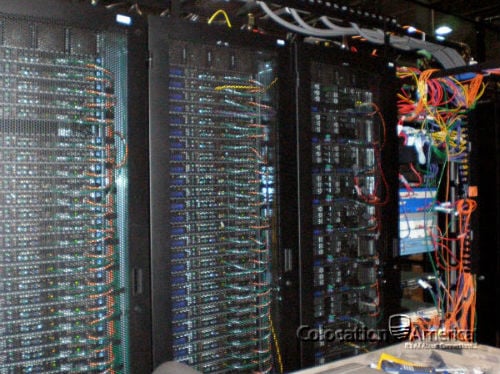What Is A Modular Data Center?
Modular data centers are portable server shelters prefabricated and built to order. Modular data centers aka MDC’s can be deployed at virtually any location so long as power and cooling provisions can be made available to connect the portable MDC structure to end users. They offer significant up-front cost savings and enough flexibility to scale resources as needed to suit the networking demands of a growing business. They are sometimes referred to ‘modular solutions’ and can be classified into 3 different categories:
1) Container based
2) Modular based
3) Modular Provider
What Is a Container Based Modular Data Center?

A container-based data center is a prefabricated modular container that can be outfitted with server racks, power, and cooling provisions and shipped to almost any location. Container-based solutions are built to international standards to withstand weather conditions specific to each geographic region.
What Is a Modular Based Solution?
A modular solution is also a pre-fabricated structure that can be made to order and deployed anywhere. This specific type of modular solution typically consists of inter-locking walls, ceilings, and floors that are built on site. Square footage is typically pre-calculated based on need.
What Is a Modular Data Center Provider?
A modular provider is a data center company who builds and then leases modular style data center solutions to customers. Modular providers work with clients to deliver solutions that fit their budget. Clients can then scale resources up, or down as needed.
What Are the Advantages of a Modular Data Center?
They offer scalable cost structures allowing clients to ‘pay as they grow.’ MDC’s offer the following advantages:
- Deployment – Easier to deploy than ‘bricks and mortar’ facilities, which can take months or years to design, build, and certify.
- Efficiency – Highly controlled environments designed to curb common inefficiencies associated with legacy data centers. Power consumption is kept to a minimum as modular server shelters are deployed on an ‘as needed’ basis.
- Cost Effectiveness – Clients can order up enough data center space to satisfy current needs of the organization. ‘Pay as you grow’ cost structure reduces up-front costs.
The need to build traditional data centers that are built in brick and mortar structures is quickly being overtaken by the emergence of modular data centers.

MDC’s comprise of all the essential equipment that data centers have, such as network elements, server racks, power systems, fire suppression, cooling systems, uninterrupted power supply, monitoring and management tools as well as power distribution units. All these essential elements are built and packaged as a single unit that is often plug and play or very easy to install and setup. The modular enclosures that the data centers come in are usually built with particular specifications in mind that have been standardized throughout the industry. The main standardized components of a MDC include cooling systems, energy or generator module as well as the IT module. These components can be scaled in accordance with the needs of the user. Businesses, both on the enterprise level and at the small business level, are opting for modular data systems mainly because of the changed economic climate that puts a higher emphasis on efficient utilization of meager resources, especially after the economic crisis of 2008 to present day. Apart from economic reasons for deploying modular systems, the speed of deployment is another attraction that they provide.
What Are the Operational Considerations of the MDC?
Standardization MDC’s are usually built off site from where they are installed and usually in an industrial setting, so that everything is made with exact specifications, using consistent materials and procedures. Since the modules are usually pre-fabricated, operational procedures can be standardized and documentation made consistent and uniform.

Data Management Software Since the modules are standardized, the design and implementation of software to manage the data centers can be made in a very detailed way to monitor and manage different detailed aspects of the data center. This means that it is easy to manage several data center modules at once as well as utilize cloud computing technology.
What Are the Design and Cost Considerations of the Modular Data Center?
Ownership Costs The main cost considerations when it comes to modular data center include:
- Cost of acquisition: the cost of purchasing these data center modules is more manageable because you can purchase only what you need immediately, and therefore over-building for the sake of future-proofing is not very important.
- Cost of installation: This cost is highly reduced in terms of time taken to set it up as well as cash used, especially because a modular data system can be installed in days or weeks at most and not over the 12 months it takes for a traditional data system.
- Cost of operation: since components are standardized, efficiency of the modules can be optimized, further reducing cost and downtime.
- Cost of maintenance: Due to the standardization, replacement of parts and the expertise to maintain the data centers is not difficult to find at an affordable cost.
Promptness of Deployment The turnaround between identifying the need for a data center to the actual installation of the data module has been greatly reduced because the modules are constructed offsite where all the tools, expertise and parts to build the system are already in place. This makes deployment a more prompt and seamless process as compared to installing or deploying a traditional data system. Deploying a modular data system can take a few weeks or a few days, as opposed to over 12 months as is the case in ordinary data centers.
Scalable Modules The beauty of MDC’s is that you can add more modules or distribute modules to different locations that need them more urgently, if need be. This means that businesses can quickly advance with data forecasts without affecting day to day operations.
Agility In emergency cases, like in disaster management, where capacity planning is crucial, MDC’s are the most efficient way to get on the ground and make an immediate impact when lives are at stake.
Power Usage Effectiveness (PUE) When it comes to power usage effectiveness, it is extremely energy efficient and becomes more efficient over time. The PUE is used to measure how energy efficient a data center module is. This is more important when it comes to green energy solutions.
Efficiency Since modular data systems are manufactured as a single unit, it is much simpler to maintain systems as well as run them because procedures and components will be quite familiar to most experts and can be done with productivity in mind.
Disaster Recovery Since the amount of data, and the sensitivity of data, is constantly increasing, it is important to have disaster protocols that will safeguard the data and equipment used as well as deploy as soon as increased capacity is required. Disaster recovery and modular data are also crucial when you need to have access to data at all times with 100% uptime.
Real Estate Since the nature of modular data systems is such that you can easily expand the capability of an organization based on how many data center units you require, this increased capacity can be in terms of new modular data centers stacked on top of each other in order to better utilize real estate space.
What Are Different Enterprises where MDC’s Are Found?
Data centers are useful and not limited to the following sectors:
- Information technology and the telecom industry
- Banking, insurance, and finance services
- Government and public organizations
- Energy sector
- Defense and security
- Healthcare and education sectors
- Others